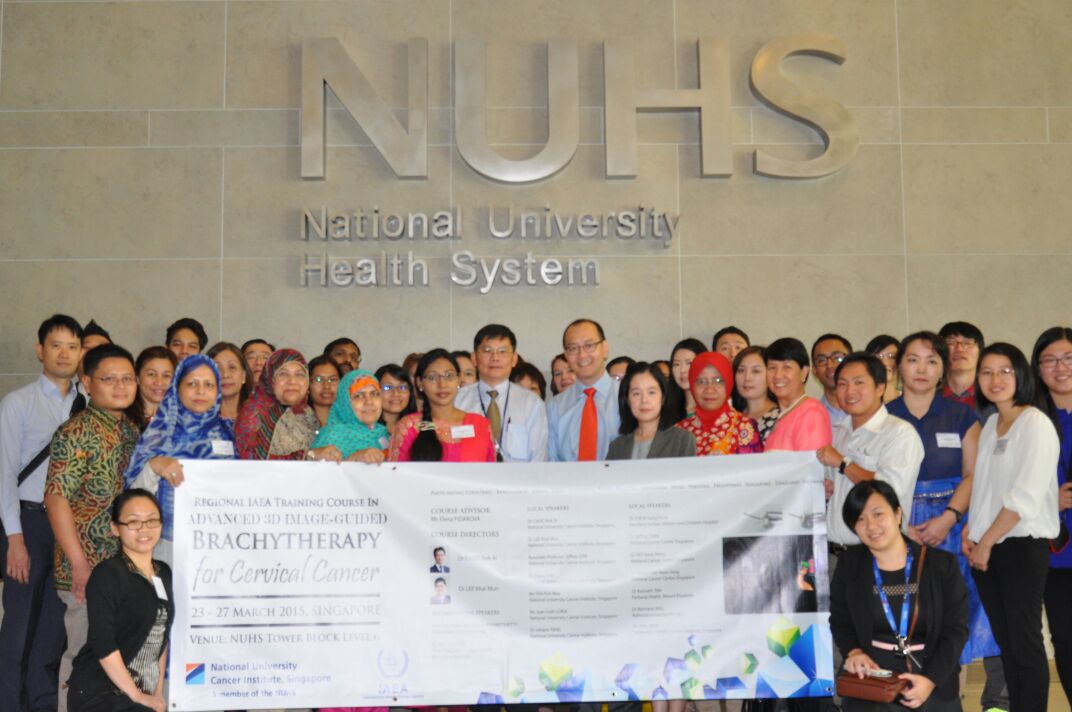
NCIS hosted the annual International Atomic Energy Agency (IAEA) Advanced Training Course on 3D Image-Guided Brachytherapy (IGBT) for cervical cancer from 23 to 27 Mar 2015.
This intensive five day course was attended by 29 participants from 14 countries across Asia. The faculty was both local and international. We had several speakers from NCIS, including Dr Choo Bok Ai, Dr Lee Khai Mun, Dr Vicky Koh and Ms Tan Poh Wee. Two international experts, Dr Umesh from Tata Memorial Hospital, India as well as Ms Sylvia from Peter Mac, Australia, were also invited to share their experience and expertise. Besides didactic lectures, participants were given ample time for interactive “hands-on” sessions, where our local physicists could give personalized attention to the participants, and impart some “tips” and “tricks” on brachytherapy planning.
This course is offered as part of the Regional Cooperative Agreement among IAEA member states to improve technical cooperation and education in our region. As the host institution for Singapore, we were privileged to have to opportunity to share our knowledge and interact with our fellow specialists in this specialized field. 3D Image-Guided Brachytherapy is relatively new and is a more accurate way of delivering radiation treatment compared to 2D brachytherapy. It is especially important when high doses of radiation are given with curative intent, such as in the treatment of cervical cancer. However, this treatment is resource-intensive and requires significant training and education of the entire medical team involved. We hope that this course has been of some value for our colleagues looking to adopt this treatment strategy.
These are what some of the participants had to say about their IAEA 2015 experience:
“Please extend our thanks to your colleagues for all the hospitality and for efforts to make us participants feel comfortable. Congratulations on a successful workshop!” – Ms Lilian
“Thank you very much for the nice arrangement and hospitality. We really had a fruitful and interesting training course.” – Mr Enkhtsetseg Vanchinbazar, Physicist, Mongolia
A commentary on medical student perspective for global health care in radiation oncology: opportunities, barriers to sustainability and future directions
/in Articles / PublicationsInt J Radiat Oncol Biol Phys 89:492-4, 2014
Written by a medical student working at NIH helping with ICEC, it describes the gap in opportunity facing students interested in altruistic service.
[This is a PDF proof- attaching the published version not yet permitted]
Read More
NCIS hosted the annual International Atomic Energy Agency (IAEA) Advanced Training Course
/in MeetingsNCIS hosted the annual International Atomic Energy Agency (IAEA) Advanced Training Course on 3D Image-Guided Brachytherapy (IGBT) for cervical cancer from 23 to 27 Mar 2015.
This intensive five day course was attended by 29 participants from 14 countries across Asia. The faculty was both local and international. We had several speakers from NCIS, including Dr Choo Bok Ai, Dr Lee Khai Mun, Dr Vicky Koh and Ms Tan Poh Wee. Two international experts, Dr Umesh from Tata Memorial Hospital, India as well as Ms Sylvia from Peter Mac, Australia, were also invited to share their experience and expertise. Besides didactic lectures, participants were given ample time for interactive “hands-on” sessions, where our local physicists could give personalized attention to the participants, and impart some “tips” and “tricks” on brachytherapy planning.
This course is offered as part of the Regional Cooperative Agreement among IAEA member states to improve technical cooperation and education in our region. As the host institution for Singapore, we were privileged to have to opportunity to share our knowledge and interact with our fellow specialists in this specialized field. 3D Image-Guided Brachytherapy is relatively new and is a more accurate way of delivering radiation treatment compared to 2D brachytherapy. It is especially important when high doses of radiation are given with curative intent, such as in the treatment of cervical cancer. However, this treatment is resource-intensive and requires significant training and education of the entire medical team involved. We hope that this course has been of some value for our colleagues looking to adopt this treatment strategy.
These are what some of the participants had to say about their IAEA 2015 experience:
“Please extend our thanks to your colleagues for all the hospitality and for efforts to make us participants feel comfortable. Congratulations on a successful workshop!” – Ms Lilian
“Thank you very much for the nice arrangement and hospitality. We really had a fruitful and interesting training course.” – Mr Enkhtsetseg Vanchinbazar, Physicist, Mongolia
Bringing cancer care to the underserved globally: a challenging problem for which radiation oncology can pioneer novel solutions
/in Articles / PublicationsInt J Radiat Oncol Biol Phys 89:443-5, 2014
[This is a PDF proof- attaching the published version not yet permitted].
First author- Norman Coleman, Senior Scientific Advisor, ICEC
Read More